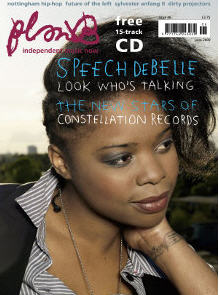Plan B (magazine)
 |
|
| Editor | Louis Pattison |
|---|---|
| Categories | Independent music, Film, Books, Visual art |
| Frequency | Monthly |
| Publisher | Frances Morgan |
| First issue | June 2004 |
| Final issue | May 2009 |
| Company | Plan B Publishing Limited |
| Country | United Kingdom |
| Language | English |
| Website | planbmag.com |
Plan B was a monthly music magazine based in London, England. It catered mainly towards independent music but did not discriminate between the relative popularity of the bands it features. Plan B also documented alternative culture such as film, comics, video games, visual art and books. It was founded by editor-in-chief Everett True (a.k.a. Jerry Thackray), art director Andrew Clare and publisher Chris Houghton, although later editor and publisher Frances Morgan was also a major influence.
In May 2009, it was announced that Plan B's forty-sixth issue would be its last.
Plan B was started after the demise of the magazine Careless Talk Costs Lives, which shared a similar ethos and many of the same contributors.
The concept originally laid down by Thackray was to exist under the radar of the mainstream music press such as the New Musical Express or Q, both of which are seen as the antithesis of Plan B. Although Thackray used to work in the mainstream media throughout the nineties under the pseudonym Everett True along with his CTCL compatriot Steve Gullick, he became disheartened by the lack of individuality and increased focus on commercialism. Thus, Plan B (along with Gullick's Loose Lips Sink Ships) was created to champion causes apparently forgotten in the mainstream press. Plan B tried to mirror the artistic nature of its content by including full page photography and colourful illustrations. This is largely due to the work of art director Andrew Clare. It is also printed in full colour on thick, satin paper, which creates a musky scent.
The emphasis of Plan B was on nurturing young talent and subsequently, many of the writers are unknown within their field. Several regular contributors do freelance work for the mainstream music press but their work in Plan B was usually more varied because the magazine did not impose a 'house style' on its writers. This often led to a more anecdotal, emotional response to art - a style which is discouraged in the mainstream press. This was reflected in the magazine's reviews, which did not contain the 'grading' or 'marking' system so commonly found elsewhere.
...
Wikipedia
